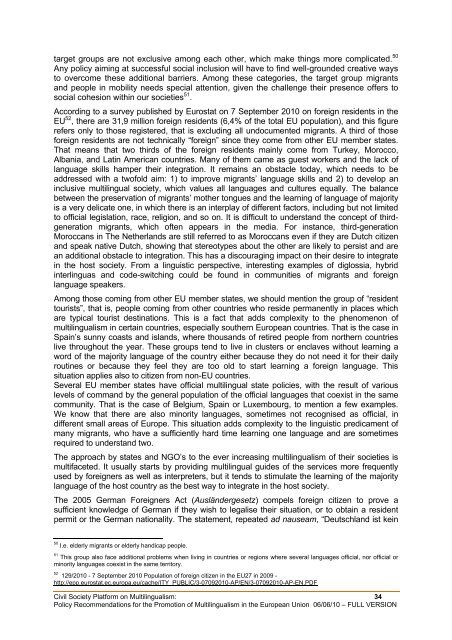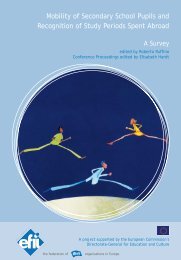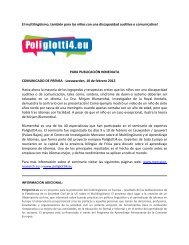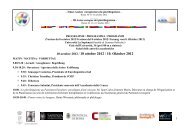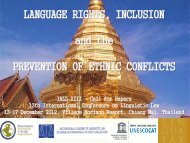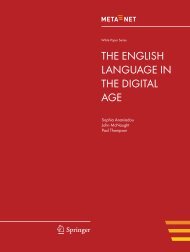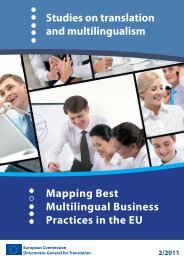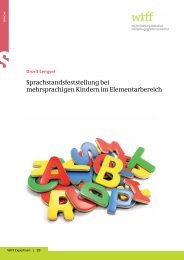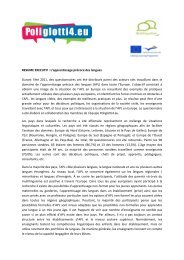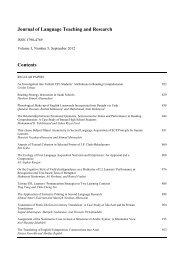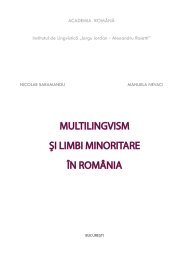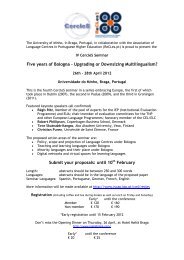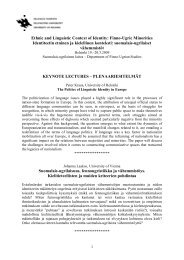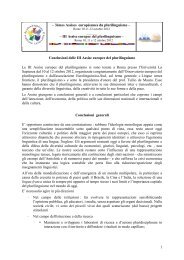FULL VERSION - European Commission - Europa
FULL VERSION - European Commission - Europa
FULL VERSION - European Commission - Europa
Create successful ePaper yourself
Turn your PDF publications into a flip-book with our unique Google optimized e-Paper software.
target groups are not exclusive among each other, which make things more complicated. 50Any policy aiming at successful social inclusion will have to find well-grounded creative waysto overcome these additional barriers. Among these categories, the target group migrantsand people in mobility needs special attention, given the challenge their presence offers tosocial cohesion within our societies 51 .According to a survey published by Eurostat on 7 September 2010 on foreign residents in theEU 52 , there are 31,9 million foreign residents (6,4% of the total EU population), and this figurerefers only to those registered, that is excluding all undocumented migrants. A third of thoseforeign residents are not technically “foreign” since they come from other EU member states.That means that two thirds of the foreign residents mainly come from Turkey, Morocco,Albania, and Latin American countries. Many of them came as guest workers and the lack oflanguage skills hamper their integration. It remains an obstacle today, which needs to beaddressed with a twofold aim: 1) to improve migrants’ language skills and 2) to develop aninclusive multilingual society, which values all languages and cultures equally. The balancebetween the preservation of migrants’ mother tongues and the learning of language of majorityis a very delicate one, in which there is an interplay of different factors, including but not limitedto official legislation, race, religion, and so on. It is difficult to understand the concept of thirdgenerationmigrants, which often appears in the media. For instance, third-generationMoroccans in The Netherlands are still referred to as Moroccans even if they are Dutch citizenand speak native Dutch, showing that stereotypes about the other are likely to persist and arean additional obstacle to integration. This has a discouraging impact on their desire to integratein the host society. From a linguistic perspective, interesting examples of diglossia, hybridinterlinguas and code-switching could be found in communities of migrants and foreignlanguage speakers.Among those coming from other EU member states, we should mention the group of “residenttourists”, that is, people coming from other countries who reside permanently in places whichare typical tourist destinations. This is a fact that adds complexity to the phenomenon ofmultilingualism in certain countries, especially southern <strong>European</strong> countries. That is the case inSpain’s sunny coasts and islands, where thousands of retired people from northern countrieslive throughout the year. These groups tend to live in clusters or enclaves without learning aword of the majority language of the country either because they do not need it for their dailyroutines or because they feel they are too old to start learning a foreign language. Thissituation applies also to citizen from non-EU countries.Several EU member states have official multilingual state policies, with the result of variouslevels of command by the general population of the official languages that coexist in the samecommunity. That is the case of Belgium, Spain or Luxembourg, to mention a few examples.We know that there are also minority languages, sometimes not recognised as official, indifferent small areas of Europe. This situation adds complexity to the linguistic predicament ofmany migrants, who have a sufficiently hard time learning one language and are sometimesrequired to understand two.The approach by states and NGO’s to the ever increasing multilingualism of their societies ismultifaceted. It usually starts by providing multilingual guides of the services more frequentlyused by foreigners as well as interpreters, but it tends to stimulate the learning of the majoritylanguage of the host country as the best way to integrate in the host society.The 2005 German Foreigners Act (Ausländergesetz) compels foreign citizen to prove asufficient knowledge of German if they wish to legalise their situation, or to obtain a residentpermit or the German nationality. The statement, repeated ad nauseam, “Deutschland ist kein50I.e. elderly migrants or elderly handicap people.51This group also face additional problems when living in countries or regions where several languages official, nor official orminority languages coexist in the same territory.52129/2010 - 7 September 2010 Population of foreign citizen in the EU27 in 2009 -http://epp.eurostat.ec.europa.eu/cache/ITY_PUBLIC/3-07092010-AP/EN/3-07092010-AP-EN.PDFCivil Society Platform on Multilingualism: 34Policy Recommendations for the Promotion of Multilingualism in the <strong>European</strong> Union 06/06/10 – <strong>FULL</strong> <strong>VERSION</strong>


